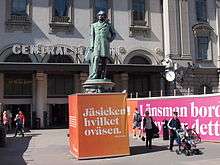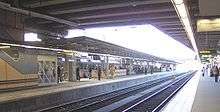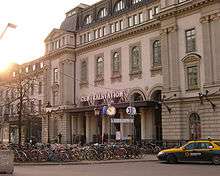Stockholm Central Station
Stockholm Central Station | |||||||||||
|---|---|---|---|---|---|---|---|---|---|---|---|
 | |||||||||||
| Location |
Stockholm, Sweden | ||||||||||
| Coordinates | 59°19′48″N 18°03′22″E / 59.330°N 18.056°ECoordinates: 59°19′48″N 18°03′22″E / 59.330°N 18.056°E | ||||||||||
| Elevation | 3 m | ||||||||||
| Owned by | Jernhusen | ||||||||||
| Operated by |
Arlanda Express Stockholmståg SJ Veolia Transport | ||||||||||
| Line(s) |
Ostkustbanan Västra stambanan | ||||||||||
| Platforms | 17 | ||||||||||
| Construction | |||||||||||
| Architect | Adolf W. Edelsvärd | ||||||||||
| History | |||||||||||
| Opened |
1871 1957 (T-Centralen) | ||||||||||
| Services | |||||||||||
| |||||||||||
Stockholm Central Station (Swedish: Stockholms Centralstation, Stockholm C) is the largest railway station in Sweden.(not counting Metro stations) It is situated in the district of Norrmalm at Vasagatan/Central Plan. Opened July 18, 1871, it has over 200,000 visitors daily,[1] of which about 170,000 are travellers (105,000 with commuter trains, 25,000 with Arlanda Express and 40,000 with other trains).
Because it is the busiest station in Sweden, engineers use the heat generated by the thousands of visitors everyday to help heat a nearby office building.[2]
In front of the central station stands a statue of Nils Ericson.
History

The station was built between 1867 and 1871 with Adolf W. Edelsvärd as the architect. Until 1925 the tracks led in to the station but during a renovation 1925-1927 the tracks were moved to the west and the former track hall was converted into a 119 meter long, 28 meter wide and 13 meter high waiting hall. During the renovation the station was extended to the south through the construction of the southern pavilion. Today this part of the station houses a conference facility. Next to the conference facility is the Royal waiting hall where the Royal Family waits when travelling by train.
In 1951 the façade towards Vasagatan was changed and given a more simplified look. In 1958 an underground passage to T-Centralen was opened.
Traffic


The station consists of two parts:
- The northern part, with platforms 1 to 7 northwards, constitutes a terminus station for the Ostkustbanan, Mälarbanan and Arlandabanan railways. Platforms 1 and 2 are reserved for the Arlanda Express, which has its own platform on the same level as the trains' floor. Platform 3 is mostly used by Uppsalapendeln and platforms 4 to 7 are used for long-distance and regional traffic and overnight traffic to the north.
- Platforms 10 to 19 in the western part constitute a passing station for Västra stambanan and local commuter trains. Platforms 10 to 12 are mostly used for long-distance and regional trains to the south, but can also be used for traffic to the north, while platforms 17 to 19 are mostly used for long-distance and regional trains to the north, but can also be used for traffic to the south. Most of the trains turn back after the Stockholm Central Station, but some trains continue towards the north.
On level with the Northern Railway Square are service depots for long-distance and regional trains. Trains arriving from the south and turning back from the central station, after passengers continuing northwards have disembarked, continue to the service depots where they are cleaned and have their supplies refilled. Then they continue back via platforms 10 to 12. Long-distance trains from platforms 4 to 8 are services in the same way near the Northern Railway Square.
Commuter train station

The Stockholm Central station is the busiest station on the Stockholm commuter rail, with about 53,000 boarding the trains and about as many disembarking every weekday (as of 2005). The commuter rail uses two platforms 13 to 16. Each platform has entries with entry gates from the lower level and a ticket sales office on the upper level with an entry from Klarabergsviadukten.
The commuter trains go on their own tracks along Ostkustbanan via Tomteboda, and after Karlberg Station they go underneath the other tracks to avoid conflict with long-distance and regional trains. After the centre, they join the Stockholm connection railway to the south, which has had two tracks since 1871. In 2006, a decision was finally made to construct Citybanan, a new track in a tunnel, and Stockholm City Station, a new station for commuter trains below T-Centralen. The construction was started in January 2009 and is scheduled to be finished in 2017.
Bus
A bus terminal called Cityterminalen is located adjacent to the main station, directly connected by a short pedestrian tunnel.
Local services offered by SL stop at various bus stops close to the main station's exits.
Metro station
Services on all lines of the Stockholm Metro network are provided on a separate station named T-Centralen. An underground pedestrian passage connects it to Stockholm Central Station.
Services


- Arlanda Express
- Stockholm-Arlanda Airport
- SJ
- Intercity services
- Falun via Uppsala, Avesta Krylbo, Borlänge
- Karlstad via Katrineholm, Hallsberg
- Göteborg via Södertälje Syd, Katrineholm, Hallsberg, Skövde, Herrljunga
- Oslo via Karlstad
- Mora via Uppsala, Avesta Krylbo, Borlänge
- Östersund via Uppsala, Gävle, Bräcke
- Sundsvall via Uppsala, Gävle
- Malmö via Norrköping, Nässjö, Lund
- Night train
- Luleå via Uppsala, Gävle, Sundsvall, Umeå
- Narvik via Umeå, Boden, Gällivare, Kiruna
- Storlien via Uppsala, Gävle, Sundsvall, Östersund, Åre
- Malmö via Norrköping, Nässjö, Alvesta
- SJ commuter rail services
- Arboga via Södertälje Syd, Strängnäs, Eskilstuna
- Hallsberg via Södertälje, Katrineholm
- Linköping via Södertälje, Nyköping, Kolmården, Norrköping
- Gävle via Uppsala, some service continues to Ljusdal
- Gothenburg via Västerås, Örebro, Hallsberg, Skövde, Herrljunga, Alingsås
- Uppsala
- Västerås via Enköping,
- Hallsberg via Enköping, Västerås, Arboga, Örebro
- X 2000, also called "SJ Snabbtåg" since 11 December 2011, Express Intercity services
- Åre via Uppsala, Sundsvall, Östersund (seasonal during ski season in Åre)
- Arvika via Hallsberg, Karlstad
- Borås via Skövde, Herrljunga
- Malmö via Norrköping, Nässjö, Lund
- Copenhagen via Norrköping, Nässjö, Lund, Malmö
- Göteborg via Katrineholm, Skövde
- Nässjö via Norrköping
- Sundsvall via Uppsala, Gävle
- Uddevalla via Skövde, Herrljunga
- Strömstad via Skövde, Herrljunga, Uddevalla (during summer holidays)
- Intercity services
- SL (operated by Stockholmståg)
- Stockholm commuter rail
- Bålsta
- Märsta
- Nynäshamn
- Södertälje
- Stockholm commuter rail
- Veolia Transport
- Night train
- Åre (Seasonal)
- Night train
- Flygbussarna (bus departing from Cityterminalen)
- Arlanda
- Bromma
- Skavsta
- Västerås
References
- ↑ "Stockholm". Jernhusen. Retrieved 13 January 2008.
- ↑ Xanthe Hinchey: "Harvesting energy: body heat to warm buildings" in BBC News, 9 January 2011
External links
![]() Media related to Stockholms centralstation at Wikimedia Commons
Media related to Stockholms centralstation at Wikimedia Commons